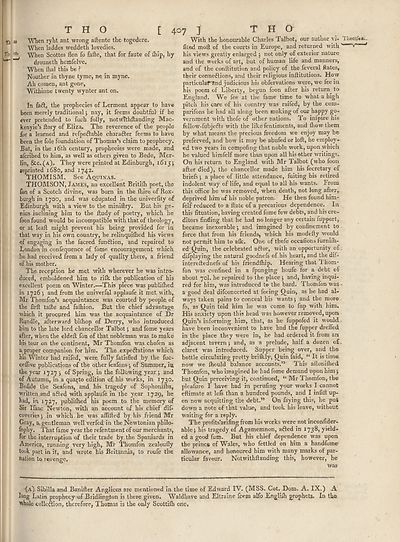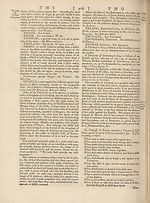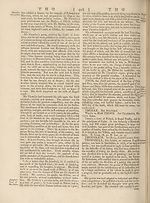Encyclopaedia Britannica, or, a Dictionary of arts, sciences, and miscellaneous literature : enlarged and improved. Illustrated with nearly six hundred engravings > Volume 20, SUI-ZYM
(453) Page 407
Download files
Complete book:
Individual page:
Thumbnail gallery: Grid view | List view

T H O [407
ft as When ryht ant wrong aftente the togedere.
When laddes weddeth lovedies.
Sn>( ^ When Scottes flen fo fade, that for faute of fhip, hy
■*' drouneth hemfelve.
When dial this be ?
Nouther in thyne tyme, ne in myne.
Ah comen, ant gone,
Withinne twenty wynter ant on.
In faft, the prophecies of Lermont appear to have
been merely traditional j nay, it feems doubtful if he
ever pretended to fuch folly, notwlthftanding Mac-
kenyie’s dory of Eliza. The reverence of the people
for a learned and refpe&able character feems to have
been the foie foundation of Thomas’s claim to prophecy.
But, in the 16th century, prophecies were made, and
afcribed to him, as well as others given to Bede, Mer¬
lin, &c. (a). They were printed at Edinburgh, 161 yt
jeprinted 1680, and I742*
THOMISM. See Aquinas.
THOMSON, James, an excellent Britidi poet, the
&n of a Scotch divine, was born in the {hire of Rox¬
burgh in 1700, and was educated in the univerlity of
Edinburgh with a view to the miniftry. But his ge¬
nius inclining him to the ftudy of poetry, which he
foon found would be incompatible with that of theology,
or at lead might prevent his being provided for in
that way in his own country, he relinquidied his views
of engaging in the facred funftion, and repaired to
London in confequence of fome encouragement which
he had received from a lady of quality there, a friend
of his mother.
The reception he met with wherever he was intro¬
duced, emboldened him to rilk the publication of his
excellent poem on Winter.—This piece was publidied
in 1726 ; and from the univerfal applaufe it met with,
Mr Tbomfon’s acquaintance was courted by people of
the fird tade and faftiion. But the chief advantage
which it procured him was the acquaintance of Dr
Bundle, afterward bifhop of Derry, who introduced
him to the late lord chancellor Talbot; and fome years
after, when the elded fun of that nobleman was to make
his tour on the continent, Mr Thomfon was chofen as
a proper companion for him. The expeftations which
his Winter had railed, were fully fatisfied by the fuc-
ceffive publications of the other feafons ; of Summer, iu
the year 1727 j of Spring, in the following year ; and
of Autumn, in a quarto edition of his works, in 1730.
Befide the Seafons, and his tragedy of Sophonilba,
written and a£ted with applaufe in the year 1729, he
had, in 1727, publidied his poem to the memory of
Sir Ifaac Newton, with an account of his chief dif-
coveriesj in which he was adided by his friend Mr
Gray, a gentleman well verfed in tlie Newtonian philo-
fophy. That fame year the refentment of our merchants,
for the interruption of their trade by the Spaniards in
America, running very high, Mr Thomfon zealoudy
took part in it, and wrote his Britannia, to roufe the
Ration to revenge.
J T H O
With the honourable Charles Talbot, our author vi- I lionifom,.
filed mod of the courts in Europe, and returned with J
his views greatly enlarged j not only of exterior nature
and the works of art, but of human life and manners,
and of the conditution and policy of the feveral dates,
their connections, and their religious inditutions. How
particulafUnd judicious his obfervations were, we fee in
his poem of Liberty, begun foon after his return to
England. We fee at the fame time to what a high
pitch his care of his country was raifed, by the com¬
panions he had all along been making of our happy go¬
vernment with thofe of other nations. To inipire his
fellow-fubjeCts with the like fentiments, and (how them
by what means the precious freedom we enjoy may be
preferved, and how it may be abufed or lod, he employ¬
ed two years in compofing that noble work, upon which
he valued himfelf more than upon all his other writings.
On his return to England with Mr Talbot (who foon
after died), the chancellor made him his fecretary of
briefs; a place of little attendance, fuiting his retired
indolent way of life, and equal to all his wants. From
this office he was removed, when death, not long after,
deprived him of his noble patron. He then found him*
felf reduced to a ftate of a precarious dependence. In
this fituation, having created fome few debts, and his cre¬
ditors finding that he had no longer any certain fupport,
became inexorable j and imagined by confinement to
force that from his friends, which his modefty would
not permit him to afk. One of thefe occafions furniffi-
ed Quin, the celebrated aftor, with an opportunity of,
difplaying the natural goodnefc of his heart, and the dif-
intereftednefs of his friendffiip. Hearing that i hom-
fon was confined in a fpunging houfe tor a debt ot
about 70I. he repaired to the place j and, having inqui¬
red for him, was introduced t© the bard. Ihomlon was ■
a good deal difconcerted at feeing Quin, as he had al¬
ways taken pains to conceal his wants j and the more
fo, as Quin told him he was come to fup with him.
His anxiety upon this head was however removed, upon
Quin’s informing him, that, as he fuppofed it would
have been inconvenient to have had the fupper drefled
in the place they were in, he had ordered it from an
adjacent tavern j and, as a prelude, half a dozen of.
claret was introduced. Supper being over, and the
bottle circulating pretty brifkly-, Quin laid, “ It is time
now we ffiould balance accounts.” This aftonilhed
Thomfon, who imagined he had fome demand upon him j
but Quin perceiving it, continued, “ Mr Thomfon, the
pleafure I have had in perufing your works I cannot
eftimate at lefs than a hundred pounds, and I infill up¬
on now acquitting the debt.” On faying this, he put
down a note of that value, and took his leave, without
waiting for a reply.
The profits'arifing from his works were not inconfider-
ablej his tragedy of Agamemnon, afted in 1738, yield¬
ed a good fum. But his chief dependence was upon
the prince of Wales, who fettled on him a handfome
allowance, and honoured him with many marks of par¬
ticular favour. Notwithftanding this, however, he
•was
(a) Sibilla and Banifter Anglicus are mentioned in the time of Edward IV. (MSS. Got. Dorn. A. IX.) A
long Latin prophecy of Bridlington is there given. Waldhave and Eltraine feem alfo Englifh prophets. In the
>#hole collection, therefore, Thomas is the only Scottilh one,
ft as When ryht ant wrong aftente the togedere.
When laddes weddeth lovedies.
Sn>( ^ When Scottes flen fo fade, that for faute of fhip, hy
■*' drouneth hemfelve.
When dial this be ?
Nouther in thyne tyme, ne in myne.
Ah comen, ant gone,
Withinne twenty wynter ant on.
In faft, the prophecies of Lermont appear to have
been merely traditional j nay, it feems doubtful if he
ever pretended to fuch folly, notwlthftanding Mac-
kenyie’s dory of Eliza. The reverence of the people
for a learned and refpe&able character feems to have
been the foie foundation of Thomas’s claim to prophecy.
But, in the 16th century, prophecies were made, and
afcribed to him, as well as others given to Bede, Mer¬
lin, &c. (a). They were printed at Edinburgh, 161 yt
jeprinted 1680, and I742*
THOMISM. See Aquinas.
THOMSON, James, an excellent Britidi poet, the
&n of a Scotch divine, was born in the {hire of Rox¬
burgh in 1700, and was educated in the univerlity of
Edinburgh with a view to the miniftry. But his ge¬
nius inclining him to the ftudy of poetry, which he
foon found would be incompatible with that of theology,
or at lead might prevent his being provided for in
that way in his own country, he relinquidied his views
of engaging in the facred funftion, and repaired to
London in confequence of fome encouragement which
he had received from a lady of quality there, a friend
of his mother.
The reception he met with wherever he was intro¬
duced, emboldened him to rilk the publication of his
excellent poem on Winter.—This piece was publidied
in 1726 ; and from the univerfal applaufe it met with,
Mr Tbomfon’s acquaintance was courted by people of
the fird tade and faftiion. But the chief advantage
which it procured him was the acquaintance of Dr
Bundle, afterward bifhop of Derry, who introduced
him to the late lord chancellor Talbot; and fome years
after, when the elded fun of that nobleman was to make
his tour on the continent, Mr Thomfon was chofen as
a proper companion for him. The expeftations which
his Winter had railed, were fully fatisfied by the fuc-
ceffive publications of the other feafons ; of Summer, iu
the year 1727 j of Spring, in the following year ; and
of Autumn, in a quarto edition of his works, in 1730.
Befide the Seafons, and his tragedy of Sophonilba,
written and a£ted with applaufe in the year 1729, he
had, in 1727, publidied his poem to the memory of
Sir Ifaac Newton, with an account of his chief dif-
coveriesj in which he was adided by his friend Mr
Gray, a gentleman well verfed in tlie Newtonian philo-
fophy. That fame year the refentment of our merchants,
for the interruption of their trade by the Spaniards in
America, running very high, Mr Thomfon zealoudy
took part in it, and wrote his Britannia, to roufe the
Ration to revenge.
J T H O
With the honourable Charles Talbot, our author vi- I lionifom,.
filed mod of the courts in Europe, and returned with J
his views greatly enlarged j not only of exterior nature
and the works of art, but of human life and manners,
and of the conditution and policy of the feveral dates,
their connections, and their religious inditutions. How
particulafUnd judicious his obfervations were, we fee in
his poem of Liberty, begun foon after his return to
England. We fee at the fame time to what a high
pitch his care of his country was raifed, by the com¬
panions he had all along been making of our happy go¬
vernment with thofe of other nations. To inipire his
fellow-fubjeCts with the like fentiments, and (how them
by what means the precious freedom we enjoy may be
preferved, and how it may be abufed or lod, he employ¬
ed two years in compofing that noble work, upon which
he valued himfelf more than upon all his other writings.
On his return to England with Mr Talbot (who foon
after died), the chancellor made him his fecretary of
briefs; a place of little attendance, fuiting his retired
indolent way of life, and equal to all his wants. From
this office he was removed, when death, not long after,
deprived him of his noble patron. He then found him*
felf reduced to a ftate of a precarious dependence. In
this fituation, having created fome few debts, and his cre¬
ditors finding that he had no longer any certain fupport,
became inexorable j and imagined by confinement to
force that from his friends, which his modefty would
not permit him to afk. One of thefe occafions furniffi-
ed Quin, the celebrated aftor, with an opportunity of,
difplaying the natural goodnefc of his heart, and the dif-
intereftednefs of his friendffiip. Hearing that i hom-
fon was confined in a fpunging houfe tor a debt ot
about 70I. he repaired to the place j and, having inqui¬
red for him, was introduced t© the bard. Ihomlon was ■
a good deal difconcerted at feeing Quin, as he had al¬
ways taken pains to conceal his wants j and the more
fo, as Quin told him he was come to fup with him.
His anxiety upon this head was however removed, upon
Quin’s informing him, that, as he fuppofed it would
have been inconvenient to have had the fupper drefled
in the place they were in, he had ordered it from an
adjacent tavern j and, as a prelude, half a dozen of.
claret was introduced. Supper being over, and the
bottle circulating pretty brifkly-, Quin laid, “ It is time
now we ffiould balance accounts.” This aftonilhed
Thomfon, who imagined he had fome demand upon him j
but Quin perceiving it, continued, “ Mr Thomfon, the
pleafure I have had in perufing your works I cannot
eftimate at lefs than a hundred pounds, and I infill up¬
on now acquitting the debt.” On faying this, he put
down a note of that value, and took his leave, without
waiting for a reply.
The profits'arifing from his works were not inconfider-
ablej his tragedy of Agamemnon, afted in 1738, yield¬
ed a good fum. But his chief dependence was upon
the prince of Wales, who fettled on him a handfome
allowance, and honoured him with many marks of par¬
ticular favour. Notwithftanding this, however, he
•was
(a) Sibilla and Banifter Anglicus are mentioned in the time of Edward IV. (MSS. Got. Dorn. A. IX.) A
long Latin prophecy of Bridlington is there given. Waldhave and Eltraine feem alfo Englifh prophets. In the
>#hole collection, therefore, Thomas is the only Scottilh one,
Set display mode to:
![]() Universal Viewer |
Universal Viewer | ![]() Mirador |
Large image | Transcription
Mirador |
Large image | Transcription
Images and transcriptions on this page, including medium image downloads, may be used under the Creative Commons Attribution 4.0 International Licence unless otherwise stated. ![]()
| Permanent URL | https://digital.nls.uk/192280436 |
|---|
| Description | Plates 516, 519 and 520 missing. |
|---|---|
| Attribution and copyright: |
|
| Description | Ten editions of 'Encyclopaedia Britannica', issued from 1768-1903, in 231 volumes. Originally issued in 100 weekly parts (3 volumes) between 1768 and 1771 by publishers: Colin Macfarquhar and Andrew Bell (Edinburgh); editor: William Smellie: engraver: Andrew Bell. Expanded editions in the 19th century featured more volumes and contributions from leading experts in their fields. Managed and published in Edinburgh up to the 9th edition (25 volumes, from 1875-1889); the 10th edition (1902-1903) re-issued the 9th edition, with 11 supplementary volumes. |
|---|---|
| Additional NLS resources: |
|

